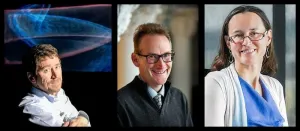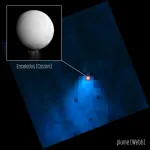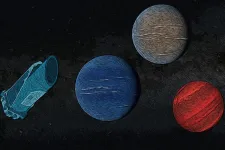(Press-News.org) The Shaw Prize in Astronomy 2023 is awarded in equal shares to Matthew Bailes, Director of the Australian Research Council (ARC) Centre of Excellence for Gravitational Wave Discovery, Duncan Lorimer, Professor and Interim Chair of Physics and Astronomy and Associate Dean for Research at Eberly College of Arts and Sciences at West Virginia University, USA and Maura McLaughlin, Eberly Family Distinguished Professor at the Department of Physics and Astronomy, West Virginia University, USA, for the discovery of fast radio bursts (FRBs).
Fast radio bursts (FRBs) are among the most extreme and mysterious phenomena in astronomy; they are intense bursts of radio emission lasting only a few thousandths of a second that release as much energy as the Sun emits over several days. The sources of the bursts are smaller than the Earth but are as far away as distant galaxies. In a seminal research paper written in 2007, Bailes, Lorimer and McLaughlin (with collaborators Narkevic and Crawford) found the first FRB, deduced many of the properties of its source, in particular its extreme distance, small size, and enormous energy, estimated the cosmic rate of production of FRBs, and highlighted their potential as cosmological probes.
Despite initial scepticism about whether this unique event was a real astronomical source, the work by Bailes, Lorimer and McLaughlin inspired others to search for these elusive events. By now almost a thousand FRBs have been discovered. Telescopes based on novel technologies are being designed and built specifically to find FRBs and identify their host galaxies.
Although the nature of FRBs remains unknown, they are almost certainly associated with neutron stars, collapsed stellar remnants that contain the mass of the Sun within a diameter of only a few tens of kilometres. FRBs have the potential to provide a unique probe of physics in extreme conditions and of the distribution of matter in the Universe.
Matthew Bailes is on the faculty of Swinburne University of Technology in Melbourne, Australia. Duncan Lorimer and Maura McLaughlin are on the faculty at West Virginia University in Morgantown, West Virginia, USA. This award is also intended to recognise the other collaborators in this research, and the investigators who collected the original data for other purposes.
More information
The IAU is the international astronomical organisation that brings together more than 12 000 active professional astronomers from more than 100 countries worldwide. Its mission is to promote and safeguard astronomy in all its aspects, including research, communication, education and development, through international cooperation. The IAU also serves as the internationally recognised authority for assigning designations to celestial bodies and the surface features on them. Founded in 1919, the IAU is the world's largest professional body for astronomers.
Links
* The Shaw Prize - https://www.shawprize.org/
Contacts
Peggy Ng
Shaw Prize
Email: peggy@shawprize.org
Lars Lindberg Christensen
IAU Director of Communications
Tel: +1 520 461 0433
Cell: +49 173 38 72 621
Email: lars.christensen@noirlab.edu
END
Matthew Bailes, Duncan Lorimer and Maura McLaughlin receive the 2023 Shaw Prize in Astronomy
Prestigious award is given for the discovery of fast radio bursts (FRBs)
2023-05-30
ELSE PRESS RELEASES FROM THIS DATE:
Are pandemic lockdowns and vaccinations complements or substitutes? Lessons learned from COVID-19 should be considered in future pandemics
2023-05-30
Worldwide, one of the initial responses to the COVID-19 virus was locking down parts of the economy to reduce social interactions and the virus’s spread. Now, the development and production of vaccines have largely replaced broad lockdowns. In a new study that considered epidemiology and economics, researchers sought to determine how the arrival of vaccines should affect the duration and intensity of lockdown policies. They concluded that boosting the rate of vaccine use influences intensity and duration of lockdowns, depending on a variety of factors.
The study was conducted by researchers at Carnegie Mellon University (CMU), the International Institute for Applied Systems Analysis, ...
To boost health care teams’ effectiveness, integrate organizational sciences research with technology development
2023-05-30
Health care organizations today are caring for patients with increasingly complex needs and leveraging larger teams that include clinicians with diverse and specialized expertise. At the same time, high turnover and labor shortages mean that facilities frequently employ a more temporary and mobile workforce. In a new commentary, researchers point out that, as a result, “the structure of health care teams often defies decades of wisdom from team-design research about the conditions that support the best possible performance.”
The article was written ...
Reusable packaging revolution is close - experts say
2023-05-30
30 May 2023 - A detailed plan to transform product packaging and significantly cut plastic production and pollution has been developed by researchers.
The study comes as government representatives meet in Paris to negotiate a legally binding global plastics treaty with a mandate to end plastic pollution.
The research, published today by the University of Portsmouth’s Global Plastics Policy Centre, commissioned by the Break Free From Plastic movement, consolidates 320 articles and papers, plus 55 new interviews with reuse experts from around the world [1], to suggest a universal definition of reuse systems and, for the ...
Silent zoo tours can generate new perspectives on animals, study suggests
2023-05-30
Visiting zoos in silence can generate a range of novel experiences, helping people to connect to animals in a more intimate way and giving visits more gravitas, according to new research.
Experts ran special silent events at Paignton and Bristol zoos as part of a wider project on the auditory culture of zoos.
Visitors were better able to focus, concentrate and even meditate on specific animals and their behaviour, which sometimes fostered feelings of intimacy with and attachment to particular zoo animals.
The research, published in TRACE: Journal for Human-Animal Studies, was conducted by Professor Tom Rice, Dr Alexander Badman-King, Professor Sam ...
World leading health experts say aviation industry must act on cabin fumes as they launch new medical guidance
2023-05-30
A group of world leading health and scientific experts are calling on the aviation industry to take action to protect passengers and aircrew from dangerous cabin fumes which they say have led to a new emerging disease.
Led by former pilot and leading global aviation health researcher Dr Susan Michaelis, the specialists have released the first medical protocol of its kind to help treat those effected by contamination of the aircraft cabin breathing air supply and collect data on contamination events.
The International Fume Events Task Force, made up of 17 doctors, occupational health specialists, toxicologists, epidemiologists and aviation experts, have spent six years researching ...
Healthy kidneys despite hypertension
2023-05-30
A mutation that causes severe hypertension also protects the kidneys from being damaged, reports a team led by Enno Klußmann of the Max Delbrück Center and the DZHK in “Kidney International”. The researchers are now exploring how the effects of the mutated gene can be used therapeutically.
Over time, high blood pressure leads to kidney damage – unless you happen to have a mutated PDE3A gene. “This mutation causes extremely high blood pressure, but the kidneys still work normally even ...
Webb Telescope finds towering plume of water escaping from Saturn moon
2023-05-30
Two Southwest Research Institute scientists were part of a James Webb Space Telescope (JWST) team that observed a towering plume of water vapor more than 6,000 miles long — roughly the distance from the U.S. to Japan — spewing from the surface of Saturn’s moon, Enceladus. In light of this NASA JWST Cycle 1 discovery, SwRI’s Dr. Christopher Glein also received a Cycle 2 allocation to study the plume as well as key chemical compounds on the surface, to better understand the potential habitability of this ocean world.
During its 13-year reconnaissance of the Saturn system, the Cassini spacecraft discovered that Enceladus has a subsurface ocean ...
Ghahari studying correlated and topological phases in Graphene Van der Waals (vdW) heterostructures
2023-05-30
Fereshte Ghahari Kermani, Assistant Professor, Physics and Astronomy, received funding for the project: "Local Probe of Correlated and topological phases in graphene Van der Waals (vdW) heterostructures."
These heterostructures are constructed by different two-dimensional (2D) monolayers vertically stacked and weakly coupled by van der Waals interactions. Such interactions take place when adjacent atoms come close enough that their outer electron clouds barely touch. This action induces charge fluctuations that result in nonspecific, nondirectional attraction.
For this project, Ghahari will ...
A telescope’s last view
2023-05-30
More than 5,000 planets are confirmed to exist beyond our solar system. Over half were discovered by NASA’s Kepler Space Telescope, a resilient observatory that far outlasted its original planned mission. Over nine and a half years, the spacecraft trailed the Earth, scanning the skies for periodic dips in starlight that could signal the presence of a planet crossing in front of its star.
In its last days, the telescope kept recording the brightness of stars as it was running out of fuel. On Oct. 30, 2018, its fuel tanks depleted, the ...
An algorithm for sharper protein films
2023-05-30
Proteins are biological molecules that perform almost all biochemical tasks in all forms of life. In doing so, the tiny structures perform ultra-fast movements. In order to investigate these dynamic processes more precisely than before, researchers have developed a new algorithm that can be used to evaluate measurements at X-ray free-electron lasers such as the SwissFEL more efficiently. They have now presented it in the journal Structural Dynamics.
Sometimes, when using the navigation system while travelling by car, the device will locate you off the road for a short time. This is due to the inaccuracy ...
LAST 30 PRESS RELEASES:
Kidney cancer study finds belzutifan plus pembrolizumab post-surgery helps patients at high risk for relapse stay cancer-free longer
Alkali cation effects in electrochemical carbon dioxide reduction
Test platforms for charging wireless cars now fit on a bench
$3 million NIH grant funds national study of Medicare Advantage’s benefit expansion into social supports
Amplified Sciences achieves CAP accreditation for cutting-edge diagnostic lab
Fred Hutch announces 12 recipients of the annual Harold M. Weintraub Graduate Student Award
Native forest litter helps rebuild soil life in post-mining landscapes
Mountain soils in arid regions may emit more greenhouse gas as climate shifts, new study finds
Pairing biochar with other soil amendments could unlock stronger gains in soil health
Why do we get a skip in our step when we’re happy? Thank dopamine
UC Irvine scientists uncover cellular mechanism behind muscle repair
Platform to map living brain noninvasively takes next big step
Stress-testing the Cascadia Subduction Zone reveals variability that could impact how earthquakes spread
We may be underestimating the true carbon cost of northern wildfires
Blood test predicts which bladder cancer patients may safely skip surgery
Kennesaw State's Vijay Anand honored as National Academy of Inventors Senior Member
Recovery from whaling reveals the role of age in Humpback reproduction
Can the canny tick help prevent disease like MS and cancer?
Newcomer children show lower rates of emergency department use for non‑urgent conditions, study finds
Cognitive and neuropsychiatric function in former American football players
From trash to climate tech: rubber gloves find new life as carbon capturers materials
A step towards needed treatments for hantaviruses in new molecular map
Boys are more motivated, while girls are more compassionate?
Study identifies opposing roles for IL6 and IL6R in long-term mortality
AI accurately spots medical disorder from privacy-conscious hand images
Transient Pauli blocking for broadband ultrafast optical switching
Political polarization can spur CO2 emissions, stymie climate action
Researchers develop new strategy for improving inverted perovskite solar cells
Yes! The role of YAP and CTGF as potential therapeutic targets for preventing severe liver disease
Pancreatic cancer may begin hiding from the immune system earlier than we thought
[Press-News.org] Matthew Bailes, Duncan Lorimer and Maura McLaughlin receive the 2023 Shaw Prize in AstronomyPrestigious award is given for the discovery of fast radio bursts (FRBs)




